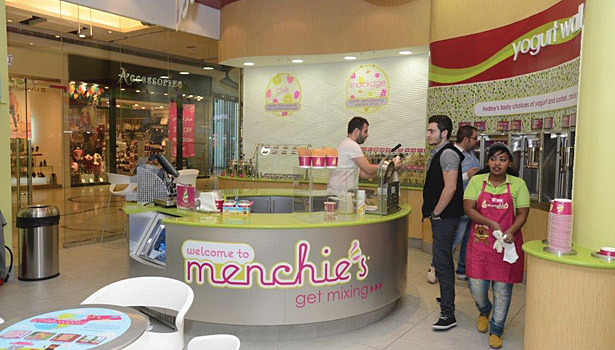Jhonny Wetwet stopped consuming dairy products (or so he thought) when he was 5 years old. Growing up in Beirut, Lebanon, Wetwet associated “milk” with the cans of dehydrated whole-milk powder his mother would bring home to mix with water in an attempt to force-feed nutrition to little Jhonny. It didn’t taste very good, so Jhonny avoided dairy products altogether.
But two years ago, Wetwet sampled the cold, crisp tartness of Menchie’s frozen yogurt. “I fell in love,” he said. “I really like the base flavor. It’s a bit sour, but not too sour.”
Today, Wetwet, 25, is the manager of a Menchie’s franchise at an upscale shopping mall in Dubai, United Arab Emirates. His Menchie’s frozen yogurt is made with milk from Scott Brothers Dairy in southern California.
The U.S. Dairy Export Council, primarily funded by the dairy checkoff, leads overseas marketing development on behalf of the U.S. dairy industry. We met Wetwet in November while in Dubai for our U.S. Dairy Business Conference, which attracted more than 70 buyers from nine nations in the Middle East and North Africa, or MENA.
His personal story illustrates four positive trends for U.S. dairy in the region, where our exports have more than tripled since 2007:
- A growing population, driven by an exploding youth culture (more than half the people are under 30).
- An enlarging middle class with rising disposable income.
- An expanding demand for tasty, innovative and nutritious food products.
- An increasing will and capacity of U.S. dairy suppliers to meet the needs of the marketplace.
“Rarely do you see these four factors combining in a region at one time like this,” said Nina Bakht Halal, director of our MENA office in Lebanon. “All the MENA countries are increasing their milk production but this will never be enough to satisfy market demands. In some of these countries, there is nothing to do but shop and eat. I was in Riyadh (Saudi Arabia) a little while ago and that’s all people seemed to do.”
With water scarce in this arid climate, the MENA region relies on imports. For example, Saudi Arabia imports more than 70% of its dairy; the UAE 80%.
Middle East politics remain tricky and tense, but when it comes to dairy, the U.S. Dairy Export Council sees huge opportunity. To open that door even wider, we conducted the single largest marketing event in our history in Dubai. The U.S. Dairy Business Conference included educational sessions, two separate supplier showcases with tabletop displays, a U.S. dairy farmer mission and a culinary conference.
Among MENA buyers, enthusiasm for what our companies offer was palpable. They want more of our business and are affirming our efforts to secure it. But because doing business in the Middle East is highly relational, they are asking for more face-time on their home turf.
If you are thinking about expanding in the MENA region, I encourage you to do so, taking into consideration these three tips:
- Assess your corporate strengths and weaknesses.
- Survey the market to determine how you might competitively address the need.
- Leave your preconceptions about the Middle East at home, approaching new opportunities with an open mind.
The future is bright. There are millions of people like Jhonny Wetwet — most of them under 30 — ready to fall in love with U.S. dairy products.



